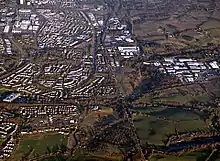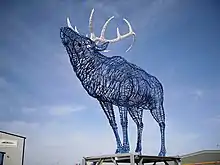Blairlinn



Blairlinn is the site of one of Cumbernauld's several industrial estates built as satellite developments on the periphery of the Scottish town's residential areas.
Toponymy
The etymology of the name is probably 'Pool, or mill-dam, plain’ (blàr linne).[2]
Modern Estate
The modern industrial estate is about a mile south of the town centre. It was opened as Blairlinn Industrial Estate by the Secretary of State for Scotland on Friday, 22 September 1961. In 1962 Telehoist was one of the first companies to set up there.[3] Some of the early factories were about 22,000 square feet with room for enlargement.[4]
Large companies using the estate include Farmfoods,[5] Dreams,[6] and Mackintosh.[7][8] There are over 20 other companies in the complex.[9][10]
North of the estate is a steep glen through Luggiebank Wood which is now a nature reserve managed by the Scottish Wildlife Trust.[11]
History
_-_geograph.org.uk_-_1739445.jpg.webp)
Before the building of the new town, there were three farmsteads known as Wester, Mid and Easter Blairlinn.[12] All three were south of the Luggie Water with Wester Blairlinn near the east bank of the Shank Burn and Easter Blairlinn near the west bank of the Cameron Burn.[13] Mid Blairlinn and Easter Blairlinn are reported to have had some coal within 900 feet of the surface.[14] There seems to have been an old flax mill at Pettycastle, West Blairlinn.[15] It is shown as a ruin on the first edition of the six inch ordnance survey map of Lanarkshire.[16] Several other old maps show Blairlinn with various spellings including maps by Charles Ross,[17] William Forrest,[18] and William Roy.[19]
References
- "Cumbernauld firm announces £2.2million revamp". Cumbernauld News. 8 July 2010. Retrieved 27 January 2018.
- Drummond, Peter, John (2014). An analysis of toponyms and toponymic patterns in eight parishes of the upper Kelvin basin (PDF). Glasgow: Glasgow University. p. 330.
{{cite book}}: CS1 maint: multiple names: authors list (link) - Taylor, Jessica (2010). Cumbernauld: The Conception, Development and Realisation of a Post-war British New Town (PDF). Edinburgh: Edinburgh College of Art. p. 284. Retrieved 25 February 2017.
- Osborn, Frederic James; Whittick, Arnold (1963). The New towns - The Answer to Megalopolis. London: McGraw-Hill. pp. 312–321. Retrieved 25 October 2017.
- Campbell, Scott (24 June 2015). "Farmfoods seek permission to expand Cumbernauld HQ". Cumbernauld Media. Archived from the original on 15 August 2016. Retrieved 6 August 2016.
- Mullen, Stacey (12 December 2013). "Depot brings jobs to Cumbernauld". Cumbernauld News. Retrieved 27 January 2018.
- Moss, Victoria (18 September 2016). "Reign of glory: how British heritage house Mackintosh took the catwalks by storm". Telegraph Media Group Limited. The Telegraph. Retrieved 27 January 2018.
- "The rebirth of the Mackintosh fashion label". The Scotsman. 8 February 2011. Retrieved 27 January 2018.
- "Endole Suite". Retrieved 27 January 2018.
- "Endole Suite". Retrieved 27 January 2018.
- "Luggiebank Wood". Scottish Wildlife Trust. Retrieved 6 August 2016.
- "Blairlinn, North Lanarkshire". The Gazetteer for Scotland. Retrieved 27 January 2018.
- "OS 25 inch map 1892-1949, with Bing opacity slider". National Library of Scotland. Ordnance Survey. Retrieved 12 October 2017.
- Brown, M. Walton, ed. (1897). Transactions Of The Federated Institution Of Mining Engineers (VOL. XII-1896-97 ed.). Newcastle-upon-Tyne: Institution of Mining Engineers (Great Britain ). p. 448. Retrieved 27 January 2018.
- Historic Environment Scotland. "Wester Blairlinn (179769)". Canmore. Retrieved 2 April 2009.
- "Pettycastle Flax Mill (ruin)". National Library of Scotland. Ordnance Survey. Retrieved 27 January 2018.
- "Ross' map with repair around Blairlin". NLS. Retrieved 27 January 2018.
- "Forrest's Map". NLS. Retrieved 27 January 2018.
- "Roy's map of the Lowlands". NLS. Retrieved 27 January 2018.
- Blaeu, Joan. "Glottiana Praefectura Inferior". National Library of Scotland. Retrieved 30 December 2017.
- "Glasgow and the county of Lanark - Pont 34". Maps of Scotland. Timothy Pont (16th century). Retrieved 31 December 2017.
- "Pont Placenames". National Library of Scotland. Retrieved 27 January 2018.
